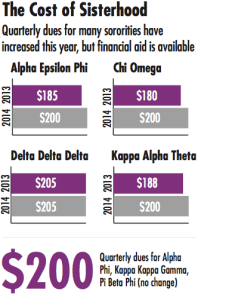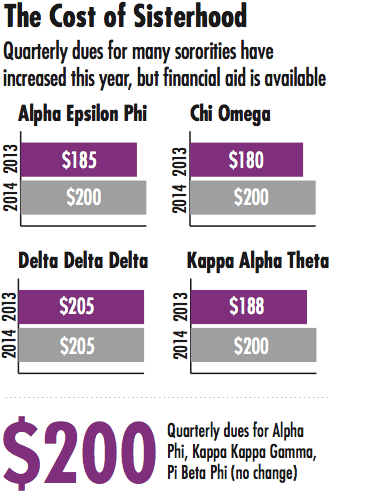As Stanford’s Greek organizations prepare for the annual spring recruitment season, Greek community leaders have sought to foster a more open conversation regarding the financial accessibility of Greek life.

“We hope to create an environment in which the Greek chapters are expecting and even encouraging potential new members to ask questions about the financial support available and the costs associated with Greek membership,” said Doug Calhoun, Stanford’s Inter-Sorority Council (ISC) advisor.
Although there is no cost for entering the Inter-Fraternity Council (IFC) recruitment or “rush” process, the ISC recruitment process does require a $35 fee from potential new members. Amanda Rodriguez, the IFC advisor, attributed the existence of that fee to higher overhead costs due to room bookings and other processes built into rush’s structure.
“We have worked to increase funding for fee waivers for new members, and the number of fee waivers offered this year is double what it was in the past,” Rodriguez said.
However, communication about financial expectations for subsequent membership, particularly for men, has been inconsistent in past years.
“The specific costs of fraternity membership are not broadly addressed during rush other than in one-on-one conversations,” said Baker Tilney ’15, chapter president of Sigma Alpha Epsilon and former IFC Financial Chair. “Perhaps IFC could play a larger role in the financial aspects of members’ experiences, and that could have a positive effect on the financial accessibility. I would say that on the chapter level, I am proud of my house. We do a good job of making our house inclusive to members of all backgrounds through waivers and payment plan options for quarterly dues.”
In the past year, both ISC and IFC leadership have launched new efforts to better support members who need help paying chapter dues as well as publicizing the fact that there are options available for students who don’t think they can afford Greek membership.
“While ISC is able to help by paying the recruitment fee, we felt like we should be doing more to help potential new members who need financial assistance later on in the Greek process,” said Taylor Dewberry ’14, the president of the ISC.
Dewberry noted that the ISC plans to create a Women’s Greek Leadership scholarship through various grants that would aim to pay for a significant portion of the individual’s dues throughout her undergraduate experience. While this idea is still in the conceptual stage, the ISC has worked to save funds and discover grants that could help complete the project in the near future.
Meanwhile, IFC leadership has also made plans to increase fraternity life’s financial accessibility.
“The hope is to use the fees that each chapter pays to IFC to create a general scholarship or rainy day fund for IFC members and chapters to access in the event of financial burden or inability to pay chapter dues,” Tilney said.
Required membership dues in IFC and ISC chapters vary by chapter and by quarter and are composed of several types of fees. Each Greek organization chapter on Stanford’s campus is affiliated with a different national organization. National organizations vary in size and the amount of costs they incur for things like insurance. Depending on how much of these costs are passed along to local chapters, every chapter on campus may have different national dues.
In an informational pamphlet about ISC recruitment for 2014, reported quarterly dues for the seven different chapters ranged from $200 to $250 per member. Five of seven chapters reported having “scholarships available.”
Scholarships to help offset or completely cover membership dues exist on a chapter-to-chapter basis.
“Scholarship availability generally depends on the opportunities provided at the national level, which Stanford students often receive, the operating budget of the chapter, and things like the presence of local alumnus groups that support chapters.” Rodriguez said.
On top of this, new members and seniors often pay a one-time set of initiation or alumnus fees.
“In general, our chapters work hard to keep costs consistent and as low as possible for their members, but like in any student group, there are fees associated with membership,” Rodriguez said.
However, members of Greek organizations do face fees outside of the structured quarterly dues.
“I do not think Greek organizations are especially financially accessible, but I do think sororities are much more accessible than fraternities based on what I know about both systems,” said former Pi Beta Phi financial officer Ally Huchro ’15.
These discrepancies between the true cost of sorority and fraternity membership may come from the higher “social fees” that fraternities incur, although it is hard to determine the actual cost associated with this type of fee.
“There are, of course, fees for things like social events or apparel that members can choose to pay,” Rodriguez said. “But we consider these ‘add-ons’ and they are not actually required for membership.”
Contact Maddy Sides at [email protected].
